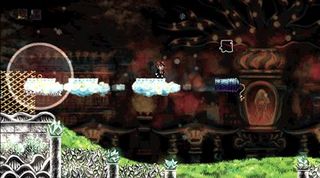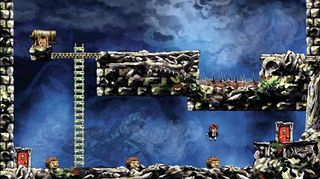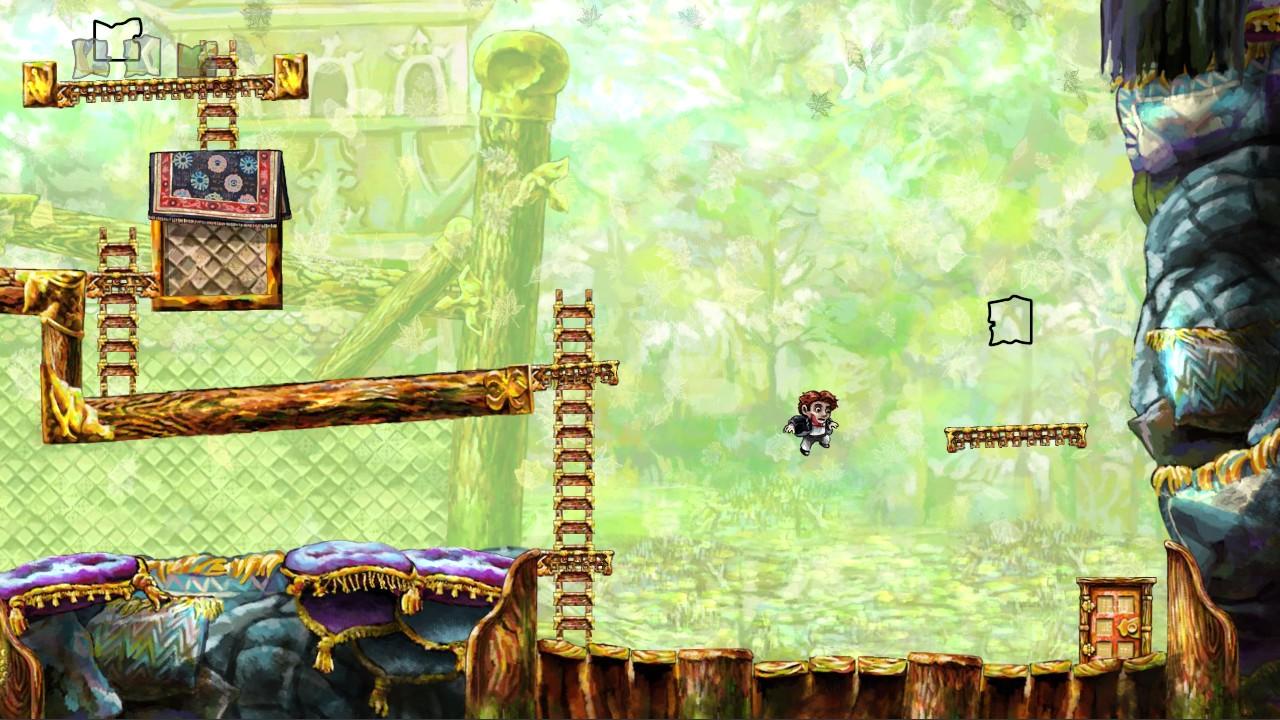Why you can trust GamesRadar+
The fifth world is the one with the previously mentioned ring that slows down time. It creates a visible bubble of slowness, from near-static at its center to barely-affected at its edges, so you can tinker with the timing of every cog in the machine of a Braid level. It’s less brain-melting than most of the previous worlds, but its levels leverage the tricks you’ve already learned to produce some hugely elaborate puzzles.

At this point, you can’t progress any further until you’ve pieced together all five pictures, which means grabbing all sixty puzzle pieces. The sudden introduction of such a strict requirement after Braid has been so forgiving is jarring, but wise. Each puzzle piece requires a different leap of logic to acquire, and you’re missing the best of Braid if you don’t force your mind to perform even the most lurching of them.
The sixth world is unlike the others: we won’t spoil the game for you by saying how, but it’s a quirk so neat that it seems obvious once you discover it. This is a brief chapter, but its conclusion is Braid’s crowning twist. It’s the first occasion the time manipulation and allegorical plot really gel, and they do it to heartbreaking effect.

It’s a magnificent moment: a revelation you perform without even realising you’re doing it. But the impact of that scene is blunted slightly by a cloudy epilogue with fiddly secret bits, when a lonely full stop would have twisted the knife unbearably. Instead it returns to disjointed stories of the princess, interpretable variously as a lover, a mother and the atomic bomb.
The one prevailing theme with the various roles the princess takes on is obsession: its grip on Tim, its destructive effect on his life, and his blindness to it. And this bears mention because it does, secretly, relate to an aspect of the game. Throughout Braid, hidden cruelly well, are eight collectible stars. They’re willfully, absurdly hard to get: one requires you to stand on a barely-moving cloud for two hours, one you’ll almost certainly have to restart the game for, and most require you to discover hidden platforms off the edge of the screen. There’s no achievement for getting them, no secret level they unlock: they’re just an empty, sad symbol of your task’s futility once it’s complete.

On one level Braid works as a cautionary tale that you can never attain what you most desperately seek: your princess. But with the stars, Braid offers a darker warning: that you can get what you want if you persist, but it will cost you something you can never get back again. And your achievement will seem hollow by comparison. At some point since Braid’s original release, someone somewhere has neglected their partner or family to chase these eight stars. And with that, Braid’s point was proved – even as it was missed.
Apr 28, 2009
More info
| Genre | Puzzle |
| Description | The artistic, post-modern, platforming/puzzler masterpiece comes to PSN, and it's just as great as it is on the 360. |
| Platform | "PS3","PC" |
| US censor rating | "Everyone 10+","Everyone 10+" |
| UK censor rating | "","" |
| Release date | 1 January 1970 (US), 1 January 1970 (UK) |
Cyberpunk sequel's associate director reveals the "hardest quest I have ever designed and implemented" is in The Witcher 3: "I was losing my mind and my sleep"
Ryan Gosling in Star Wars? The Barbie star is reportedly in talks to join Deadpool & Wolverine director Shawn Levy's movie

33 years after his cartoon was canceled, Captain Planet is back (and kinda hot) in a new comic book
Most Popular



